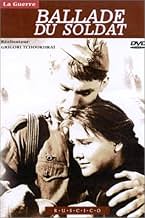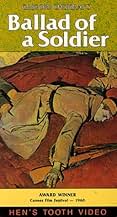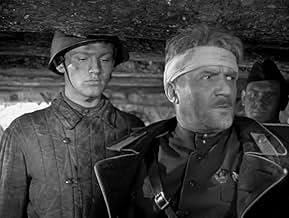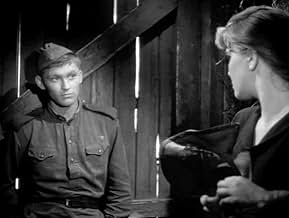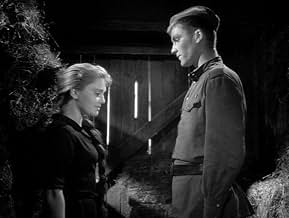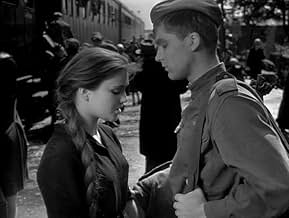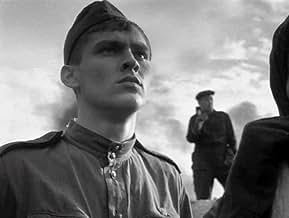IMDb रेटिंग
8.2/10
12 हज़ार
आपकी रेटिंग
अपनी भाषा में प्लॉट जोड़ेंYoung Russian soldier Alyosha earns a medal, but asks to visit his mother instead. His journey recounts various kinds of love during wartime.Young Russian soldier Alyosha earns a medal, but asks to visit his mother instead. His journey recounts various kinds of love during wartime.Young Russian soldier Alyosha earns a medal, but asks to visit his mother instead. His journey recounts various kinds of love during wartime.
- निर्देशक
- लेखक
- स्टार
- 1 ऑस्कर के लिए नामांकित
- 6 जीत और कुल 4 नामांकन
Vladimir Ivashov
- Alyosha Skvortsov
- (as Volodya Ivashov)
Mariya Kremneva
- Elizaveta Petrovna (Pavlov's Wife)
- (as M. Kremnnyova)
फ़ीचर्ड समीक्षाएं
In the 1950s, 2 very critically acclaimed Russian films were made. The first film was "The cranes are flying" by Mikhail Kolotozov. It is true that it was a good film but it was more of a love story. If there is a film which all human beings must watch, it is "Ballad of a soldier" made by the great Russian cinéaste Grigori Chukrai. I still have vivid memories of this film, although I saw it in 1986 on India's only public television network called "Doordarshan". What I like the most about this film is that it has tremendous emotional power to move anyone regardless of that person's ideologies or beliefs. It talks of war without begging for kindness, mercy or pity. Such is the greatness of this masterpiece. In my opinion," Ballad of a soldier" is not only the greatest Russian film ever made, it is one of the greatest world cinema gems too. For those who have not yet seen it, one word of advice. Throw away all your Hollywood flicks and watch this humanist masterpiece. PS :10 out of 10 is a understatement. "Ballad of a soldier" would easily fetch 100 out of 10.
Ballad of a Soldier (1959)
An old fashioned but utterly gorgeous film about a soldier discovering something bigger about himself than even the war could teach him on the battlefield. It's a drama about life, photographed with what strikes me as a European poetic visual sensibility. In its lyrical flow, it is amazing. No other word for it.
In 1959, the Soviet Union was only 14 years away from the end of the war that cost them 23 million deaths (10 million of these were soldiers). And a ravaged countryside. This is monumental in a way that we Americans have trouble appreciating, even though our own losses were around 1 million, including civilians directly and indirectly. But with this kind of staggering history, the very touching tale of a very innocent boy wanting to get back to his mother for a single hug is heart wrenching. Director Grigori Chukhrai, himself Ukrainian, seems to know that his role, in the Khrushchev era of Cold War USSR, is to show the best of the Soviet heart and soul.
The journey, for the viewer, is often filled with silence, and with carefully composed shots of the boy, alone or with other travelers (often soldiers). The light and the framing is moving even on its own terms. Many times the key face in foreground is sharp and softly stark while many other faces fall out of focus around this, camera tilted, or looking up, with flickers of light from trees outside the train window or a diffused glow of a grey sky drenching it all with melancholy.
Alyosha, the young man who by some fast wits and luck knocked out two tanks in the first scene and earned this special trip, meets a variety of people on his way who each represent a part of the Soviet (mostly Russian, but with a nod to Ukrainians) experience: a wounded man going home without his leg, a young conscript heading to the front to probably never return, this same young man's father in a hospital apparently dying, and a girl his own age, equally pure and nearly untouched by life's horrors. In every case, there is a kind of Soviet optimism that is almost refreshing even if it is just slightly reminiscent of their earlier propaganda movies. Because, the wounded man meets his wife at the station and is renewed, the young conscript is cheerful and hale, the father is proud and glad his son is a good soldier, the mean officer has an understanding heart, the sergeant gives his only soap to the traveller, and so on.
But this kind of goodness is part of what makes the film special. There is no room for noir cynicism, or even existential loneliness. After all, Alyosha has found the truest of true love, and even though he may be returning to the war to never return, the boy and girl have elevated each other, and the movie, and the viewer, with a real sense of what being good is all about. If you can find this movie, see it by all means.
An old fashioned but utterly gorgeous film about a soldier discovering something bigger about himself than even the war could teach him on the battlefield. It's a drama about life, photographed with what strikes me as a European poetic visual sensibility. In its lyrical flow, it is amazing. No other word for it.
In 1959, the Soviet Union was only 14 years away from the end of the war that cost them 23 million deaths (10 million of these were soldiers). And a ravaged countryside. This is monumental in a way that we Americans have trouble appreciating, even though our own losses were around 1 million, including civilians directly and indirectly. But with this kind of staggering history, the very touching tale of a very innocent boy wanting to get back to his mother for a single hug is heart wrenching. Director Grigori Chukhrai, himself Ukrainian, seems to know that his role, in the Khrushchev era of Cold War USSR, is to show the best of the Soviet heart and soul.
The journey, for the viewer, is often filled with silence, and with carefully composed shots of the boy, alone or with other travelers (often soldiers). The light and the framing is moving even on its own terms. Many times the key face in foreground is sharp and softly stark while many other faces fall out of focus around this, camera tilted, or looking up, with flickers of light from trees outside the train window or a diffused glow of a grey sky drenching it all with melancholy.
Alyosha, the young man who by some fast wits and luck knocked out two tanks in the first scene and earned this special trip, meets a variety of people on his way who each represent a part of the Soviet (mostly Russian, but with a nod to Ukrainians) experience: a wounded man going home without his leg, a young conscript heading to the front to probably never return, this same young man's father in a hospital apparently dying, and a girl his own age, equally pure and nearly untouched by life's horrors. In every case, there is a kind of Soviet optimism that is almost refreshing even if it is just slightly reminiscent of their earlier propaganda movies. Because, the wounded man meets his wife at the station and is renewed, the young conscript is cheerful and hale, the father is proud and glad his son is a good soldier, the mean officer has an understanding heart, the sergeant gives his only soap to the traveller, and so on.
But this kind of goodness is part of what makes the film special. There is no room for noir cynicism, or even existential loneliness. After all, Alyosha has found the truest of true love, and even though he may be returning to the war to never return, the boy and girl have elevated each other, and the movie, and the viewer, with a real sense of what being good is all about. If you can find this movie, see it by all means.
"Ballada o soldate" has one of the most poignant sequences of all war movies:when the mother holds only for a few minutes, her dear boy in her arms,it's impossible to hold back your tears .I saw the movie for the first time thirty years ago and I have never forgotten it.Far from politics ,"ballada o soldate" is an universal poem,enhanced by a magnificent grandiose score,which enhances the simple beauty of the pictures,climaxing on a symphony for the finale.
Aliocha's furlough is so short (48 hours) and it's such a long way to his dear home.His journey becomes an odyssey ,but ,unlike Ulysses,his happiness will be short-lived.He and the girl form one of the most touching,lovable and innocent couple you will see on a screen.Their simple joys ,particularly when they share the soldier's food,or when they meet again in the desert station,are the ones which make a life worthwhile,even in the hell which surrounds them.
Sometimes recalling Sirk's " a time to love and a time to die"(1958)from Erich Maria Remarque ,the great German pacifist writer,with which it shares the same disgust of war ("I wanted to film a subject which could condemn war",the director said),"ballada o soldato" is one of these rare movies that will reward you each time you watch it.
Aliocha's furlough is so short (48 hours) and it's such a long way to his dear home.His journey becomes an odyssey ,but ,unlike Ulysses,his happiness will be short-lived.He and the girl form one of the most touching,lovable and innocent couple you will see on a screen.Their simple joys ,particularly when they share the soldier's food,or when they meet again in the desert station,are the ones which make a life worthwhile,even in the hell which surrounds them.
Sometimes recalling Sirk's " a time to love and a time to die"(1958)from Erich Maria Remarque ,the great German pacifist writer,with which it shares the same disgust of war ("I wanted to film a subject which could condemn war",the director said),"ballada o soldato" is one of these rare movies that will reward you each time you watch it.
Alyosha, a 19-year old private in the Soviet army, more or less by accident neutralizes three German tanks and is allowed to return home to see his mother and fix her roof on a six-day leave. On a train he meets another stow-away, the timid Shura, and falls in love. The movie depicts the people he meets on his way home through war-torn Russia.
This is an amazing film, a kind of shaggy-dog story and one you are not liable to forget. It is so extremely well-paced in a natural, flowing rhythm with a smooth, unassuming camera and lovely lighting. Be that all is it may, whatever the film's affinities with Pudovkin masterpieces such as 'Earth' and 'Deserter', 'Ballad of a Soldier' is all heart, empathy and sincerity, and it will clutch at your heart-strings.
The boy is not yet jaded in the grown-up fashion, and the people he meets stir him into immediate sympathy, Alyosha is simply one of the most likable characters you will encounter in a film, without being trite or cutesy. And the people he meets are hardly ever as sympathetic as he is, witness private Pavlov's girlfriend, whom Alyosha promised to bring the soap as a gift. When he gets there, she has a lover visiting her, and although Alyosha judges her, the film itself does not. Its description of budding young love is enchanting, but it has, finally, its own bitter irony.
Watch this whenever you get the chance. Do not let prejudice about what you think Soviet cinema is like detain you.
This is an amazing film, a kind of shaggy-dog story and one you are not liable to forget. It is so extremely well-paced in a natural, flowing rhythm with a smooth, unassuming camera and lovely lighting. Be that all is it may, whatever the film's affinities with Pudovkin masterpieces such as 'Earth' and 'Deserter', 'Ballad of a Soldier' is all heart, empathy and sincerity, and it will clutch at your heart-strings.
The boy is not yet jaded in the grown-up fashion, and the people he meets stir him into immediate sympathy, Alyosha is simply one of the most likable characters you will encounter in a film, without being trite or cutesy. And the people he meets are hardly ever as sympathetic as he is, witness private Pavlov's girlfriend, whom Alyosha promised to bring the soap as a gift. When he gets there, she has a lover visiting her, and although Alyosha judges her, the film itself does not. Its description of budding young love is enchanting, but it has, finally, its own bitter irony.
Watch this whenever you get the chance. Do not let prejudice about what you think Soviet cinema is like detain you.
In World War Two, almost thirty million Russian soldiers and civilians were killed in the fight against fascism, a fact mainly ignored during the paranoia of the Cold War. In our attempt to demonize everything Russian, we also overlooked stories of individual heroism. In 1959, Russian director Grigory Chukhraj made a film attempting to describe "what happens when the world loses a single person" and it is a masterpiece. The beautiful and moving Ballad of a Soldier tells a personal story that illuminates how war can ravish both an individual and a country. The film is set in Russia in the midst of the war. Pvt. Alyosha Skvortsov (Vladimir Ivashov), a signaller, has earned a commendation by destroying two German tanks. Instead of accepting a medal, he requests to be granted a four-day leave to go home and visit his mother.
We learn early through the narration that this soldier did not survive the war so his journey home to visit his mother for one last time becomes all the more poignant. The film, however, is not about a destination but about a journey. The four-day trip encompasses a lifetime of experience. Before hiding out in a freight car, Alyosha encourages a soldier (Yevgeny Urbansky) who has lost his leg to go home to his wife. Along the way, he hitches a ride on a rain-soaked road with a woman deprived of sleep for 48 hours. He brings a present of soap to an unfaithful wife of another soldier but changes his mind and gives it to her father who longs for his son's return. He also meets Shura (Zhanna Prokhorenko), a radiant young woman who, like him, hides out in a freight car. Reluctant at first and fearful of Alyosha, the young couple experiences their first love in several sensitive scenes but it is to be short-lived.
Ballad of a Soldier, of course, aims to present Russian soldiers in the best possible light yet Chukhraj does not hesitate to show his characters as real human beings with flaws. A venal security guard is willing to grant the young soldier free passage in a freight car in exchange for cans of beef, and the wife of a soldier is unfaithful to her soldier husband, a sequence that landed the director in trouble with the Russian censors. In Alyosha, Chukhraj has created a good person: kind, loving, and noble but not larger than life, a soldier perhaps typical of millions of young men who gave their lives to protect their homeland. Their struggle and personal sacrifice has been immortalized in a great film.
We learn early through the narration that this soldier did not survive the war so his journey home to visit his mother for one last time becomes all the more poignant. The film, however, is not about a destination but about a journey. The four-day trip encompasses a lifetime of experience. Before hiding out in a freight car, Alyosha encourages a soldier (Yevgeny Urbansky) who has lost his leg to go home to his wife. Along the way, he hitches a ride on a rain-soaked road with a woman deprived of sleep for 48 hours. He brings a present of soap to an unfaithful wife of another soldier but changes his mind and gives it to her father who longs for his son's return. He also meets Shura (Zhanna Prokhorenko), a radiant young woman who, like him, hides out in a freight car. Reluctant at first and fearful of Alyosha, the young couple experiences their first love in several sensitive scenes but it is to be short-lived.
Ballad of a Soldier, of course, aims to present Russian soldiers in the best possible light yet Chukhraj does not hesitate to show his characters as real human beings with flaws. A venal security guard is willing to grant the young soldier free passage in a freight car in exchange for cans of beef, and the wife of a soldier is unfaithful to her soldier husband, a sequence that landed the director in trouble with the Russian censors. In Alyosha, Chukhraj has created a good person: kind, loving, and noble but not larger than life, a soldier perhaps typical of millions of young men who gave their lives to protect their homeland. Their struggle and personal sacrifice has been immortalized in a great film.
क्या आपको पता है
- ट्रिवियाThe can of meat the train guard is eating from was clearly marked: "U.S. Meat". This would have been correct in actual life due the United States' Lend Lease with the Soviet Union.
- गूफ़The movie is set in July 1942 (a news report over loudspeakers mentions a Soviet retreat from Rostov and Voronezh). Yet the film depicts German Tiger and Soviet T 34/85 tanks, which came into service, respectively, in mid 1943 and early 1944.
- भाव
Alyosha Skvortsov: Comrade General, instead of my decoration, could I go home to see my mother?
- कनेक्शनFeatured in Fejezetek a film történetéböl: A szovjet film 1953-1970 (1990)
टॉप पसंद
रेटिंग देने के लिए साइन-इन करें और वैयक्तिकृत सुझावों के लिए वॉचलिस्ट करें
- How long is Ballad of a Soldier?Alexa द्वारा संचालित
विवरण
- रिलीज़ की तारीख़
- कंट्री ऑफ़ ओरिजिन
- भाषाएं
- इस रूप में भी जाना जाता है
- Ballad of a Soldier
- फ़िल्माने की जगहें
- Mosfilm Studios, मास्को, रूस(Studio)
- उत्पादन कंपनी
- IMDbPro पर और कंपनी क्रेडिट देखें
- चलने की अवधि
- 1 घं 28 मि(88 min)
- रंग
- ध्वनि मिश्रण
- पक्ष अनुपात
- 1.37 : 1
इस पेज में योगदान दें
किसी बदलाव का सुझाव दें या अनुपलब्ध कॉन्टेंट जोड़ें

